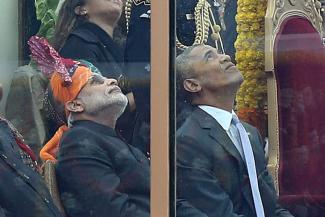World leadership
Incoherent challengers

North America and the European Union look increasingly self-centred and are struggling to cope with their own issues. Some observers feel that their era is coming to an end and that world leadership is up for grabs. It would be wrong, however, to underestimate the G7, because there is no other group of nations with similar influence – not least because the G7 are backed up by the EU and NATO, two organisations with coherent interests, values and constitutions.
The BRICS – Brazil, Russia, India, China and South Africa – have been holding their own annual summits for a while, and that is welcome. The global community needs alliances that structure international debate and facilitate global policy-making. But compared with the G7, the BRICS look fractured. No G7 government feels militarily threatened by another G7 government the way India feels threatened by China.
Prime Minister Narendra Modi was proud to have US President Barack Obama attend his country’s big military parade in Delhi in January, not China’s President Xi Jinping. Modi’s roots, moreover, are in a Hindu-supremacist organisation that wants its faith to lead the world. That notion seems ridiculous in Beijing, to put it mildly.
Russia used to be part of the BRICS and the G8. Because of its nationalist-military adventure in eastern Ukraine, it was expelled from the G8, which became the G7. It is true that the other BRICS leaders have not formally disowned President Vladimir Putin, but they did shun him at the Australian G20 summit in November. Neither China nor India can afford to endorse his idea of ethnic identity defining national borders. In both countries, identity politics are explosive.
China, Russia and India cover a huge contiguous territory, but their political relations are tense. Polite visitits of Modi in China or Xi in Russia won’t change that over night. The Soviet Union and India used to be allied against China and the USA. Today, Delhi seems more interested in teaming up with Washington than Moscow. On the other hand, Beijing seems to appreciate Moscow as a partner in sabre-rattling, which makes sense given that the People’s Republic’s arms build-up is irritating most Asian nations. At the same time, China is taking advantage of Russia being unable to sell commodities to Europe and North America. For most practical purposes, Russia is becoming a useful link in China’s supply chain, not a strategic military partner.
Brazil and South Africa are very far away. They like having partners in the international arena, but apart from opposing “the west”, the BRICS have little in common. Just consider their political cultures: India and Brazil are competitive democracies where governments are likely to lose power in elections. South Africa has a democratic constitution, but is dominated by the ANC, the former liberation movement. The Russian government believes in “managing” democracy, while China’s does not believe in democracy at all.
The public in North America, Europe and Japan would be foolish to think in terms of G7 versus BRICS. In view of global collective-action challenges, cooperation with all big players is necessary. The G7 would do well to keep engaging the BRICS, both the group and its individual members. Cooperation must beat polarisation.
Apparently, the Chinese government knows that too. A case in point is the Asian Infrastructure Bank (AIIB) in Beijing, a new international financial institution that China has proposed. Western media recently read the decision of the four European G7 members to join it as a sign of Chinese strength. The reason was that the US administration had warned the AIIB will be a Chinese policy tool.
There is another, more interesting assessment however. FT journalist Alan Beattie has argued that China’s leaders want G7 partners within the AIIB because they know international lending is a tough business and the new bank will run into difficulties sooner or later. When that happens, they hope to rely on the competence of more experienced donors. This would mean that the AIIB will not become a visceral opponent of the World Bank, but a like-minded complement.
Hans Dembowski
Link:
Beattie, A.: Europeans in the AIIB: a sign of Chinese weakness.
http://blogs.ft.com/beyond-brics/2015/03/26/europeans-in-the-aiib-a-sign-of-chinese-weakness/








